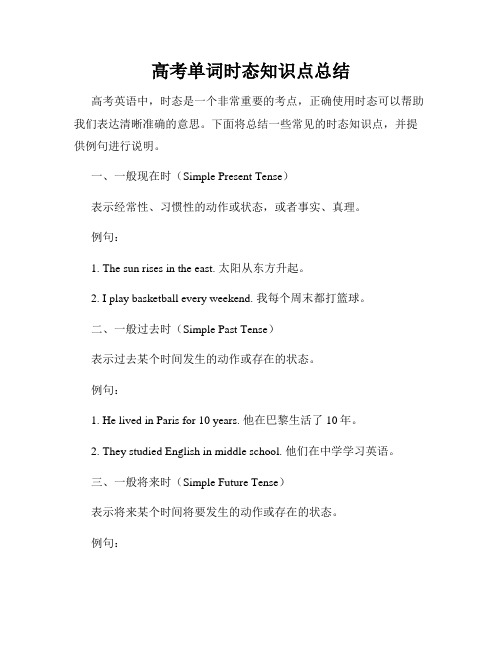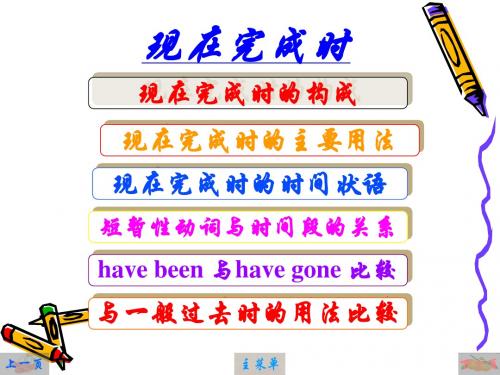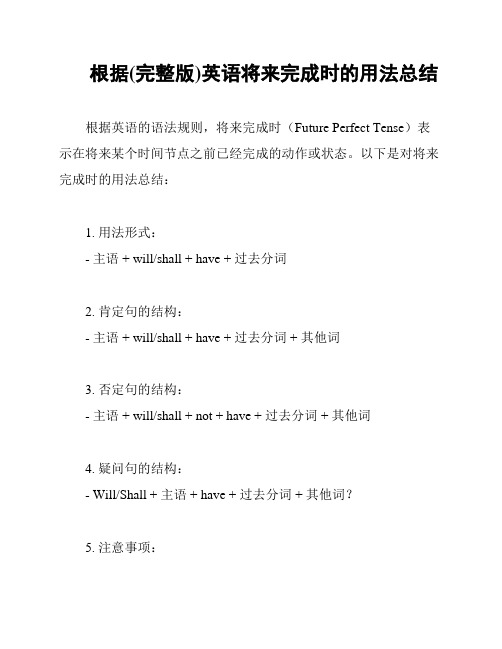高考英语复习 第四章 完成式(Perfect Tense)
高考单词时态知识点总结

高考单词时态知识点总结高考英语中,时态是一个非常重要的考点,正确使用时态可以帮助我们表达清晰准确的意思。
下面将总结一些常见的时态知识点,并提供例句进行说明。
一、一般现在时(Simple Present Tense)表示经常性、习惯性的动作或状态,或者事实、真理。
例句:1. The sun rises in the east. 太阳从东方升起。
2. I play basketball every weekend. 我每个周末都打篮球。
二、一般过去时(Simple Past Tense)表示过去某个时间发生的动作或存在的状态。
例句:1. He lived in Paris for 10 years. 他在巴黎生活了10年。
2. They studied English in middle school. 他们在中学学习英语。
三、一般将来时(Simple Future Tense)表示将来某个时间将要发生的动作或存在的状态。
例句:1. They will visit their grandparents next week. 下周他们会去拜访祖父母。
2. I will finish my homework tonight. 今晚我会完成作业。
四、现在进行时(Present Continuous Tense)表示目前正在进行的动作。
例句:1. She is reading a book now. 她正在看书。
2. They are playing football in the park. 他们正在公园踢足球。
五、过去进行时(Past Continuous Tense)表示过去某个时间正在进行的动作。
例句:1. I was watching TV when she called me yesterday. 昨天她打电话给我时我正在看电视。
2. They were having dinner at that time. 那时他们正在吃晚餐。
高考时态知识点总结

高考时态知识点总结时态是英语语法中非常重要的一个概念,掌握好时态的使用可以使我们的表达更加准确、清晰。
在高考中,时态知识点的考查频率也相当高。
下面是对高考常考的时态知识点进行总结,希望能对广大考生有所帮助。
一、一般现在时(Simple Present Tense)一般现在时用于表示习惯性的动作、客观事实、真理以及现在的状态等。
常见的句子结构有:1. 主语+谓语动词:I play basketball.2. 主语+be(am/is/are)+表语:They are students.3. 主语+助动词do/does+动词原形:She doesn't like coffee.二、一般过去时(Simple Past Tense)一般过去时用于表示发生在过去某个时间的动作或状态。
常见的句子结构有:1. 主语+谓语动词:She danced at the party last night.2. 主语+助动词did+动词原形:I didn't see him yesterday.三、一般将来时(Simple Future Tense)一般将来时用于表示将来某个时间将要发生的动作或者一般的计划、安排。
常见的句子结构有:1. 主语+will+动词原形:He will go to Beijing tomorrow.2. 主语+be going to+动词原形:We are going to visit our grandparents next week.四、现在进行时(Present Continuous Tense)现在进行时用于表示现阶段正在进行的动作。
常见的句子结构有:1. 主语+be(am/is/are)+动词-ing形式:They are playing tennis now.2. 主语+be(am/is/are)+not+动词-ing形式:She is not watching TV at the moment.五、过去进行时(Past Continuous Tense)过去进行时用于表示过去某个时间正在进行的动作。
现在完成时讲解(经典)

现在完成时的运用:
• 1)already 和yet • already用于肯定句,放于句中或句末,在 句中时,位于助动词或系动词后,实义动 词前。 • yet用于否定句和疑问句,一般在句末。 • I have already finished my homework. • I haven’t finished my homework yet.
leave-- be away (from) join-- be in/be a/an…
come/go (to) --be (in/at)start/begin-- be on
arrive (at/in)--be (in/at) die-- be dead
get (to)-- be (in/at) close-be closed
上一页 主菜单
下一页
现在完成时的构成
have (has)+ 过去分词
上一页
主菜单
下一页
现在完成时 ( present perfect tense)
past
present(now)
future
do my homework
现在完成时的主要用法
1.表示过去发生的某一动作对现在造成的影响或结果。 -- It’s so dark. --Someone has turned off the light. (有人刚把灯关了,对现在造成的结果是:现在很黑) -- Are you free? --I have finished my homework. I am free (我已经完成了家庭作业,对现在造成的结果是很有空)
上一页
主菜单
下一页
现在完成时的主要用法
2.表示过去已经开始,
持续到现在的动作或状 态.常与since + 过去的时间点,for + 一段时 间,so far 等时间状语连用。
高考英语动词时态语态复习课件公开课

动词的时态 ( Tenses) Fill in the blanks. I _____ (study) hard abroad every day and I _____ (get) along well with my roommates, but sometimes I _____ (miss) my families.
belong
(1)表心理状态、情感的动词:like, love, hate, care, remember, believe, want, mind, wish, agree, mean, need。 (2) 表存在的状态动词:have, appear, exist, lie, remain, seem, belong to, depend on。 (3) 瞬间动词:begin/start, allow, accept, permit, promise, admit, plete。 (4)感官动词:see, hear, notice, feel, smell, sound, taste, look。
Let’s practice
1.Daniel __________ (live) in Beijing since he came to China. 2.The boys are tired. They _______________ (just play) a ball game. 3. I went to Egypt in 1986. Then in 2004 I went there again. I __________ (be) to Egypt twice.
根据(完整版)英语将来完成时的用法总结

根据(完整版)英语将来完成时的用法总结
根据英语的语法规则,将来完成时(Future Perfect Tense)表示在将来某个时间节点之前已经完成的动作或状态。
以下是对将来完成时的用法总结:
1. 用法形式:
- 主语 + will/shall + have + 过去分词
2. 肯定句的结构:
- 主语 + will/shall + have + 过去分词 + 其他词
3. 否定句的结构:
- 主语 + will/shall + not + have + 过去分词 + 其他词
4. 疑问句的结构:
- Will/Shall + 主语 + have + 过去分词 + 其他词?
5. 注意事项:
- 时间状语词常用于将来完成时的句子中,如by, by the time, by the year等;
- 表示时间点或时间段的状语词在将来完成时的句子中一般用于主句之后;
- 将来完成时常用于表示过去某一时刻之前已经发生的动作;
- 将来完成时也可以用于表达推测、假设等含义。
例句:
- 我们将在明天下午完成这项工作。
We will have finished this work by tomorrow afternoon.
- 你认为在明年你会学会弹钢琴吗?Will you have learned to play the piano by next year?
以上是对将来完成时的用法总结,希望对您有帮助。
高考英语语法 现在完成时和现在完成进行时(共27张PPT)

already:“I已h经av”e通al常re用ad于y肯re定a句d 中th,is放b在oo句k中. 。 有时,也用在疑问句中表示惊讶。
Have you eaten up all the food already ?
Yet:
“仍然,还 ” 用在疑问句和否定句 中,放在句末。
I haven’t read this book yet . Have you had breakfast yet ?
ever never
“曾经”通常用于疑问句 和肯定句中,放在句中。 I have ever seen this film.
Have you ever been to the USA ?
__f_o_r __two days
__s_in_c_e__1997
__si_n_ce__yesterday
__fo_r___two weeks
afternoon
___s_in_c_e _three years
__si_n_ce__I came here ago
__si_n_ce__last Sunday __s_in_c_e__ last month
强调过去发生的动作对现在产生的结 果或影响
1. My father bought many books for me yesterday .
Now , I have a lot to read because
m__y_f_a_t_h_e_r_h__as__b_o_u_g_h_t_m__a_n_y_b_o_o_k_s__f_or_ me.
3. 现在完成时往往同表示不确定的过去时 间状语连用,如already, yet, just, before, recently, still, lately等标志词
高中英语16种时态用法讲解(附例句)
高中英语16种时态用法讲解(附例句)1. 一般现在时 simple present tense用法:A) 表示现在发生的动作、情况、状态和特征【例】My father is not home yet. 我父亲还没回家.She is a student. 她是一个学生。
B) 经常性、习惯性动作,常与表示频度的副词连用,如always,often,seldom等【例】He always eats an apple in the morning. 他常常在早上吃一个苹果。
C) 表示客观事实和普遍真理The earth moves around the sun. 地球绕太阳转动。
D) 表示按计划安排好的,或将要发生的动作,可用一般现在表将来,但仅限于start, leave, go, arrive, begin等单词【例】The train leaves at 3:00 p.m.. 火车三点发车。
The show begins in half an hour. 半小时后演出开始。
E) 在时间和条件状语从句中,主句是将来时,从句通常用一般现在(有时也用现在完成时)表示将来事情【例】I will go to bed when he comes back. 等他回来了我就去睡觉。
If you don't stop the yelling, I will leave right now. 如果你还继续大吼大叫的话,我现在就走。
2. 现在进行时 present progressive tense用法:A) 表示说话时正在进行的动作【例】They are having lunch. 他们在吃饭。
B) 表示现阶段正在进行的动作【例】We are looking for a new house. 我们现在在找新房子。
3. 现在完成时 present perfect tense用法:A) 表示动作到现在为止已经完成或刚刚完成【例】I have just finished my homework. 我刚刚才写完作业。
over时态用法
over时态用法英语中有多种时态,其中最常用的是现在时、过去时和将来时。
然而,除了这三种基本时态之外,还有一些其他时态,如完成时、进行时、完成进行时等。
在这些时态中,有一种被称为“over”的时态,它主要用于表示某个动作或状态已经结束或完成。
本文将详细介绍over时态的用法。
一、over时态的定义Over时态是一种表示动作或状态已经结束或完成的时态。
它通常用于描述一个过程或事件在一段时间内发生,然后在某个时刻结束。
这种时态可以用来强调一个动作或状态的持续时间,以及它在何时结束。
二、over时态的形式Over时态有两种形式:1. 完成式(perfect tense):表示动作或状态已经完成,通常与时间状语连用。
例如:I have finished my homework.(我已经完成了我的作业。
)2. 进行式(progressive tense):表示动作或状态正在进行,通常与时间状语连用。
例如:She was cooking dinner when I arrived.(我到达时,她正在做晚饭。
)三、over时态的用法1. 表示过去的动作或状态Over时态可以用来表示过去的动作或状态。
在这种情况下,它通常与过去的时间状语连用。
例如:- He had been studying for three hours before he took a break.(他在休息之前已经学习了三个小时。
)- They had finished their work before the deadline.(他们在截止日期之前完成了工作。
)2. 表示过去持续的动作或状态Over时态还可以用来表示过去持续的动作或状态。
在这种情况下,它通常与表示一段时间的时间状语连用。
例如:- She had been living in New York for five years before she moved to Los Angeles.(她在搬到洛杉矶之前在纽约生活了五年。
高考英语二轮复习专题动词的时态(tense)课件 (共25张PPT)
学以致用
2017 课标全国 II
Later, engineers m___a_n__a_g_e__d_ (manage) to construct railways in a system of deep tunnels, which
became known as the Tube.
2017 课标全国 III
Tip 3 牢记固定句式
1.It/This/That is/was the first/second/…time that sb./sth. have(has)/had done… 2.hardly…had done…when…did…和 no sooner…had done…than…did… 3.It is (high) time that … did/should do… 4….was/were doing… when…did… 5.祈使句+and/or+陈述句,陈述句为一般将来时。
考点#43; 动词过去分词
用法 1.表示一件事情发生在过去,而另外一件事情先于它发生(即表“过去的过去”),那么 发生在前的动作要用过去完成时; He said that he had been abroad for 3 years. 2.表示从过去某一时间开始,一直延续到过去另一时间的动作。常用的时间状语: by/until/before/by the end of+表示过去的某一时间。 By then, he had learnt English for 3 years.
PART 05
学以致用
学以致用
2018 课标全国 I
while running regularly can’t make you live forever, the review says it ___i_s___ (be) more
超实用高考英语复习:present perfect continuous现在完成进行时
Past perfect continuous
• I had been working in the garden all day, and all I wanted to do was sleep.
They have been building the new road around the school for more than a year.
Teacher to student: Have you done your homework? Teacher to student: Have you been doing your homework?
01:26:14 I don’t know what you have been ladling into yourself.
Thor
01:34Why, it must have been enforcing Father’s last command.
01:53 I have been hearing about the New Mexico situation.
Has the film been starting yet?
Which of the two sentences below is the better or more likely?
They have built the new road around the school for more than a year.
Which of the two sentences below is the better or more likely?
Has John told you about the party next week? - No, we were talking about last weekend.
- 1、下载文档前请自行甄别文档内容的完整性,平台不提供额外的编辑、内容补充、找答案等附加服务。
- 2、"仅部分预览"的文档,不可在线预览部分如存在完整性等问题,可反馈申请退款(可完整预览的文档不适用该条件!)。
- 3、如文档侵犯您的权益,请联系客服反馈,我们会尽快为您处理(人工客服工作时间:9:00-18:30)。
2008高考英语复习 第四章 完成式(Perfect Tense) 4§1 现在完成式(Present Perfect Tense) 完成式的形式是 verb to have + past participle,每一个动词,都有过去式和过去分词,以下就是一些例子: 原式 过去式 过去分词(past participle) go went gone come came come see saw seen do did done watch watched watched get got gotten(或got) have had had use used used buy bought bought listen listened listened draw drew drawn paint painted painted leave left left arrive arrived arrived dance danced danced kill killed killed write wrote written run ran run swim swam swum snow snowed snowed eat ate eaten love loved loved fly flew flown spread spread spread hit hit hit drink drank drunk take took taken grow grew grown sell sold sold ride rode ridden steal stole stolen break broke broken walk walked walked read read read sing sang sung work worked worked 以下的句子都是用了现在完成式: I have read this book. I have seen the movie. I have lived here since 1973. I have studied English for a long time. He has washed his hands. He has left. He has already completed the report. The storm has arrived. I have taken the job. I have written the letters. I have not seen him since 1975. I have never seen this man before. 什么情况之下要用现在完成式呢? 1. 首先假设我们有一件事,发生在过去,而一直延续到现在,就要用现在完成式,这种句子后面常有since或for。以下是这种情形的例子: (1)自从1963年,我一直在念英文。 I have studied English since 1963. (2)自从1975年以后,我就住在这里。 I have lived here since 1975. (3)自从我是一个小孩子,我就喜欢摇滚乐。 I have loved rock and roll music since I was a child. (4)自从去年,我就从来没有见过他。 Since last year, I have never seen him. (5)自从1950年以后,他就一直在此工作。 He has worked here since 1950. (6)我认识他已经很久了。 I have known him for a long time. (7)他练习网球已经四年了。 He has already practiced tennis for (the past) four years. (8)我穿这件夹克很久了。 I have worn this jacket for a very long time. (9)我开这辆汽车很久了。 I have driven this car for a long time. (10)好久没有下雨了。 It has not rained for a long time. 2.使用现在完成式的另一情况是强调已经完成的事,比方说,你说〝我已经写了那封信〞,就可以用现在完成式,或者,你说〝他已经完成了工作〞。以下是这类的例子: (1)我已经写了这封信。 I have already written the letter. (2)他已经完成了工作。 He has already completed the work. (3)我已经测试了这个程序。 I have already tested the program. (4)我已经收到了你的信。 I have already received your letter. (5)他已搬到了一个较大的房子。 He has already moved to a bigger house. (6)虽然他很年轻,但他已写了三本小说。 Although he is young, he has already written three novels. (7)我打了二次电话给他,他都没有回答。 I called him twice, he has never answered. 3.现在完成式用来表示一种经验,举例来说,〝我曾经到过美国〞、〝我曾见过李总统〞、〝我有生以来没有跳过舞〞,这些都应该用现在完成式,例如: (1) 我曾经到过美国。 I have been to America. (2) 我曾见过李总统。 I have seen President Lee. (3) 我有生以来没有跳过舞。 I have never danced in my life. (4) 我看过〝双城记〞。 I have read The Tale of Two Cities. (5) 他曾吃过这种冰淇淋。 He has tasted this kind of ice cream. (6) 我未曾见过雪。 I have never seen snow. (7) 你曾见过雪吗? Have you ever seen snow? (8) 你登过玉山吗? Have you ever climbed Jade Mountain? 4.现在完成式可以用来表示一件过去常发生的事: (1) 今年我国已有二次台风。 We have already had two typhoons so far this year. (2) 他今年已发表了三篇论文。 He has already published three papers this year. (3) 过去一年,我看了三次〝铁达尼号〞。 In the past year, I have seen The Titanic three times. 对读者而言,最重要的是〝现在完成式〞和〝过去式〞不同究竟在那里?最重要的不同在于,一旦在句子中讲一件过去发生的事,而且指定特定的时间,就一定要用〝过去式〞,而不能用〝现在完成式〞。比方说,〝我曾经看过「铁达尼号」〞,可以用现在完成式,因为这句话没有指明任何特定的时间,假如说,〝我昨天晚上去看「铁达尼号」〞,就一定用过去式,读者不妨看看以下的比较: (a)I went to America last year. I have been to America. (b)I saw The Titanic last year. I have seen The Titanic twice. (c)I finished my homework late last night. I have finally finished my homework. (d)I studied English when I was a small child. I have studied English since I was a child. (e)I went to church yesterday. I have never been to church. 以下的句子是错的,请特别注意: *(1)I have seen the movie last year. *(2)I have never been to America last year. *(3)He has never finished his work last night. 现在完成式常和since、for、already、never、ever等字一起使用,以下都是这类的例子: (1)I have already had dinner. (2)Since this summer began, we have already had two storms. (3)It has not rained for a long time. (4)I have never talked to this man before. (5)I have never met your father. (6)Have you ever been to America? (7)He has already won three awards. (8)I have stayed here since June.
